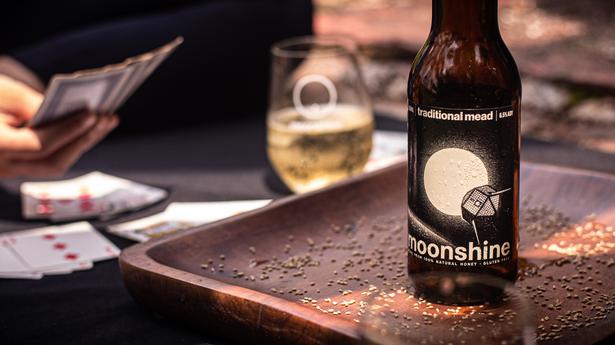
Moonshine Meadery offers a fruity-sweet variant: hopped mead
The Hindu
The latest addition to Moonshine Meadery’s craft liquor catalogue is a fruity variant flavoured with hops and their in-house multiflora honey
Oops, they did it again. Maharashtra’s quirkily-named Moonshine Meadery has just announced the launch of another new variant — hopped mead — with the fruitiness of Citra, Mandarina, and Amarillo hops overlaid with the sweetness of their own multiflora honey. Of course, that could mean some current much-loved flavours might be phased out. But that is the way all genuine craft beverage manufacturers work — with seasonal and fresh produce.
In the four years since their launch, much has happened, including a pandemic. Having said that, for Moonshine Meadery, one of Asia’s largest meadery, the focus remains steady on building the category it created — the honey-based alcoholic beverage beloved of the Vikings and celebrated in old Indian texts — a drink, arguably the most ancient in the world, but lost to time. For co-founders Nitin Vishwas and Rohan Rehani, it was time to reintroduce it to modern India. “It wasn’t a cool, new business plan — just something that checked off multiple boxes personally,” admits Rehani, explaining that mead comes from the Welsh word meddyglyn, referencing the drink’s reputed ancient medicinal powers.
To start with, all they had was a 1,300 sq.ft. shed, two 1,000 litre tanks, two hand-cranked labelling machines and support from the local microbrewing community. “We wanted to adopt the ‘minimal viable product’ technique before setting up additional capacity,” admits Rehani. So, upscaling was a case of ‘shooting in the dark’ as they were completely unsure if their business would be viable. “We would buy equipment only if the production team complained two months in a row!” By the end of 2019, they had begun thinking more long-term — ironically just before Covid hit. “We went from boutique to slightly serious boutique,” jokes Rehani, “As our aspirations crystallised, we went through a tectonic shift in mindset. The market has proved us wrong. ” As the pandemic subsided they scaled up to 10 large tanks, a state-of-the-art centrifuge and automated bottling and labeling machines expanding operations to 25,000 square feet sq.ft. with space to grow further.
And thereby hangs a tale. Global data shows mead’s popularity on the uptick — a half-billion-dollar industry with an annual growth of 12%, something that would eventually reflect in Indian markets, believes Vishwas, quoting Bollywood. Sharabi (1984) depicted Amitabh Bachchan downing whisky, but in Dil Chahta Hai (2001), the young cast quaffed beer and wine reflecting the growing preference among youth for lower alcohol beverages.
Echoing world trends, younger (under 30) Moonshine drinkers have gravitated towards it attracted by its quirkiness and quality ingredients. “Initially we thought it might be someone well-travelled with a disposable income, but we were wrong,” admits Vishwas, “It’s both men and women, who are proud of their Indian identity and enjoy quality Indian drinks.”
Moonshine’s mainstay is their honey, mead’s single most valuable ingredient and a major factor that has earned them a double-gold in international competitions. Carefully sourced by qualified beekeeper Rehani to supplement their own hives, Moonshine currently uses six tonnes a month, a big jump from the 500 kg they started with. “Experiments have shown us a marked difference in fermentation quality and flavours with pure honey,” he says.
Rehani can discuss honey for hours: our conversations cover its fermentation process, yeast, nutrients and chemical formulae to flavours of his favourite sidr honey, newly launched. “When I first tasted it, my jaw dropped. It was creamy, textured, with butterscotch flavours.”

In October this year, India announced its intention to build Maitri II, the country’s newest research station in Antarctica and India’s fourth, about 40 forty-odd years after the first permanent research station in Antarctica, Dakshin Gangotri, was established. The Hindu talks to Dr Harsh K Gupta, who led the team that established it

How do you create a Christmas tree with crochet? Take notes from crochet artist Sheena Pereira, who co-founded Goa-based Crochet Collective with crocheter Sharmila Majumdar in 2025. Their artwork takes centre stage at the Where We Gather exhibit, which is part of Festivals of Goa, an ongoing exhibition hosted by the Museum of Goa. The collective’s multi-hued, 18-foot crochet Christmas tree has been put together by 25 women from across the State. “I’ve always thought of doing an installation with crochet. So, we thought of doing something throughout the year that would culminate at the year end; something that would resonate with Christmas message — peace, hope, joy, love,” explains Sheena.

Max Born made many contributions to quantum theory. This said, he was awarded the Nobel Prize for physics in 1954 for establishing the statistical interpretation of the ____________. Fill in the blank with the name of an object central to quantum theory but whose exact nature is still not fully understood.










